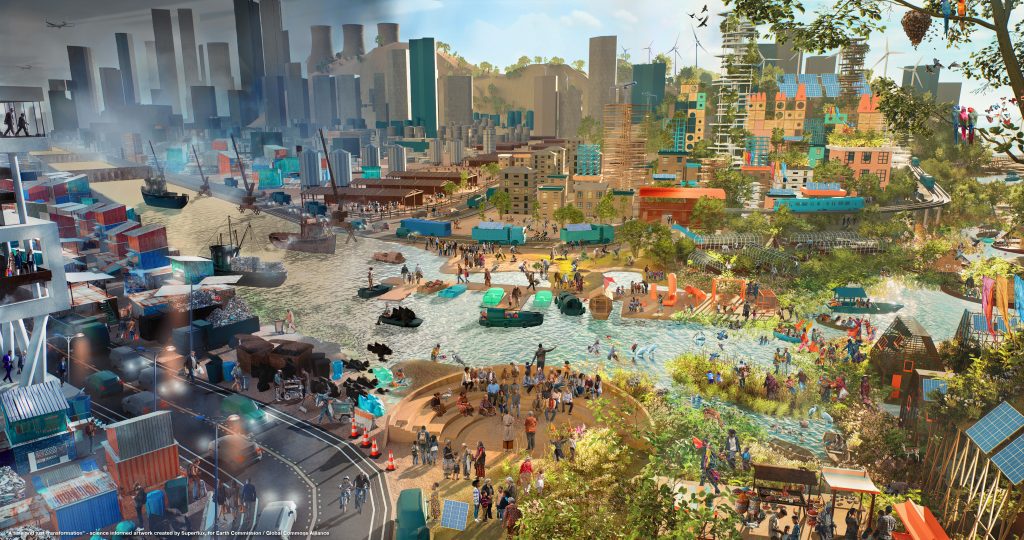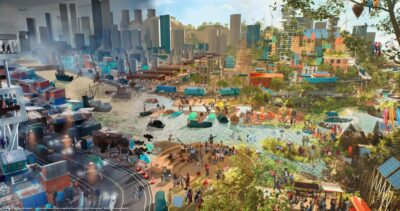How to create a safe and just space rich in opportunities for a healthier Earth
12/09/2024
This article was originally published on WEF Agenda on September 12, 2024.
By Professor Joyeeta Gupta, former co-chair of the Earth Commission and Professor of Environment and Development in the Global South at the University of Amsterdam and, IHE Delft Institute for Water Education, and Professor Johan Rockström, co-chair of the Earth Commission and Director, Potsdam Institute for Climate Impact Research (PIK)
- It is possible for all humans to escape poverty and be safe from harm caused by the Earth’s system changes.
- To achieve this, economic systems and technologies must dramatically transform and critical resources must be more fairly used, managed and shared.
- The ‘safe and just space’ is rich in opportunities, the time to act to make it a reality is now.
In September 2024, the Lancet Planetary Health Journal published a paper we co-wrote with over sixty leading natural and social scientists from the Earth Commission. Our research builds on the Safe and Just Earth System Boundaries and incorporates Earth System Justice to identify a safe and just space for humanity on Earth, while outlining the transformation pathways we can take towards it.
Our findings show that it is possible for all humans to escape poverty and be safe from harm caused by Earth system change — if economic systems and technologies are dramatically transformed and critical resources are more fairly used, managed and shared. These changes — facilitated and enacted by governments, the private sector and civil society together — provide an historic opportunity for societies to thrive on a stable planet for generations to come.
Today, the Earth is already showing clear signs of distress. Rising temperatures, rapid ice and forest loss and soil degradation are having severe impacts on human health and ecosystems. Vulnerable communities are the most affected, but everyone, including the wealthy, is at risk. We all depend on clean air and water, biodiversity and a stable climate. These intricately interdependent ‘global commons’ are in crisis due to overconsumption, pollution and poor management of Earth’s critical resources. As a result, the planet is on the brink of irreversible tipping points, which is already destabilizing weather patterns, communities, ecosystems and markets globally.
Safe and just boundaries are a novel way to combine Earth system stability with the imperative to prevent significant harm and ensure access to natural resources for people. The boundaries — first published last year — can be seen as the ‘ceiling’ for human extraction of natural resources and pollution, within which the Earth system can remain stable and resilient and people can be safe from harm. Now, with this new research, we have added a ‘foundation’ showing what the global population needs from the Earth system to live a life free from poverty.
This is the first time scientists have quantified safety (a stable planet) and justice (people being protected from harm and ensured a life free from poverty) in the same units – demonstrating that justice is a prerequisite for the safety of the planet and its people.
We still have time
Currently, we are far outside the safe and just space, but it is not too late. With bold and immediate action, we can transform the way humanity inhabits the planet, ensuring it remains stable and resilient, while supporting equitable human development. The time left to act, however, is extremely limited. The challenge now lies in the speed and scale of transformation. We must shift from an incremental approach to transformational, systemic change that is fair for all.
True transformation requires us to:
1) Move from gradual, linear changes to non-linear (transformational) changes across all systems.
2) Adopt a holistic (non-fragmented), whole planet-people approach to governance.
3) Ensure that planetary safety and justice considerations are embedded in all decision-making.
In practice, this requires a well-coordinated, intentional effort between policymakers, businesses, civil society and communities to push for changes to how we run the economy. We can only manage what we can measure, which is why there’s a need for high-resolution, real-time monitoring of Earth risks and human justice (harm, access and agency), as well as quantitative science-based targets for all the safe and just boundaries.
Collaboration is essential
Science, business, policy and civil society actors will need to establish even stronger collaborations so that the safe and just boundaries can be operationalised in cities and businesses. The Global Commons Alliance and others are already working on such collaborations, but for them to succeed in time we need:
- Legislation that protects the global commons, based on a redefinition of the global commons for the Anthropocene. Already most people (72% of the G20 public according to IPSOS Mori) agree that it should be a criminal offence for leaders of large businesses or senior government officials to approve or permit actions they know are likely to cause damage to nature and climate that is widespread, long term or cannot be reversed.
- The elimination of monopolies over critical common resources.
- Compensation rules for harm caused to people and nature.
- Debt cancellation for low-income countries, freeing them to focus on climate resilience and sustainable development.
We also need more efficient and effective management and fair distribution of resources at all levels of society. Addressing the excesses of some communities will enable better access to basic resources for those who need them the most.
Reaching the safe and just space is possible
All of this is possible. The transformations we propose will enable the economy and people to thrive and they already enjoy broad public support. Geopolitical instability, a major concern for today’s CEOs, is minor compared to the disruption an out-of-balance Earth system will bring. If we don’t take action now, we risk trying to subsist on a destabilized planet, whether we like it or not.
The global commons – our shared planet and its interconnected ecosystems – are our collective inheritance and responsibility. Safeguarding these commons by moving within the safe and just space will stabilize the economy and enable a new and improved direction of development, it will also help stabilize our societies during these times of profound change. The safe and just space is rich in opportunities. The time to act is now.
It is possible for all humans to escape poverty and be safe from harm caused by the Earth’s system changes.
To achieve this, economic systems and technologies must dramatically transform and critical resources must be more fairly used, managed and shared.
The ‘safe and just space’ is rich in opportunities, the time to act to make it a reality is now.

